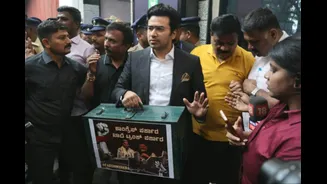Explore 9 leadership styles to inspire your Indian team. From transformational to bureaucratic, find what suits your context best
In the dynamic landscape of the Indian workplace, effective leadership is
the cornerstone of success. Gone are the days of autocratic command; today's leaders must be adept at inspiring and motivating their teams through diverse approaches.
Understanding and implementing the right leadership style can unlock potential, foster collaboration, and drive organizational growth. Let's explore nine leadership styles that can help you become a more effective and inspiring leader.
The Transformational Leader: Inspiring Change and Growth
Transformational leaders are visionaries. They paint a compelling picture of the future and inspire their teams to strive towards ambitious goals.
In the Indian context, where tradition often intersects with modernity, transformational leaders excel at navigating change, fostering innovation, and empowering employees to take ownership of their work. These leaders inspire teams to do better which promotes progress.
The Servant Leader: Putting People First
Servant leadership emphasizes serving the needs of the team. This style resonates deeply in Indian culture, where respect for elders and a sense of community are highly valued.
Servant leaders prioritize the growth and well-being of their team members, fostering a supportive and inclusive environment where everyone feels valued and empowered to contribute their best. They help team members develop their skills and do better.
The Democratic Leader: Fostering Collaboration and Ownership
Democratic leaders involve their teams in decision-making processes, valuing diverse perspectives and fostering a sense of shared ownership. This approach is particularly effective in India's diverse workforce, where different backgrounds and experiences can enrich the problem-solving process.
They make team members feel included.
The Autocratic Leader: Providing Clear Direction in Times of Crisis
While not always the preferred style, autocratic leadership can be effective in situations that demand swift and decisive action.
In crisis situations or when dealing with inexperienced teams, a clear and directive approach can provide the necessary structure and guidance to navigate challenges effectively. This works well in certain types of businesses.
The Laissez-Faire Leader: Empowering Experienced Teams
Laissez-faire leaders provide their teams with autonomy and trust, allowing them to make decisions and manage their own work. This style is best suited for highly skilled and self-motivated teams who require minimal supervision.
In the Indian context, where independent thinking and entrepreneurship are on the rise, laissez-faire leadership can empower teams to innovate and excel. This helps employees develop ownership.
The Transactional Leader: Focusing on Goals and Rewards
Transactional leaders focus on setting clear goals, providing feedback, and rewarding performance. This style is effective for driving productivity and ensuring that tasks are completed efficiently.
In the Indian workplace, where performance-based incentives are becoming increasingly common, transactional leadership can motivate employees to achieve specific targets. Goal setting helps keep teams grounded.
The Strategic Leader: Shaping the Future with Vision
Strategic leaders focus on long-term planning and aligning the organization's resources to achieve its goals. They possess a deep understanding of the market and the competitive landscape, enabling them to make informed decisions and guide the organization towards sustainable growth.
These leaders are crucial for success.
The Coaching Leader: Developing Potential and Building Skills
Coaching leaders focus on developing the skills and potential of their team members. They provide guidance, support, and constructive feedback to help individuals grow and improve their performance.
This style is particularly valuable in the Indian context, where continuous learning and skill development are essential for career advancement. Leaders help team members acquire new skills.
The Bureaucratic Leader: Ensuring Consistency and Compliance
Bureaucratic leaders emphasize rules, procedures, and compliance. This style is suitable for organizations that operate in highly regulated industries or require strict adherence to standards.
In the Indian context, where governance and transparency are increasingly important, bureaucratic leadership can help organizations maintain ethical standards and ensure accountability. This helps maintain compliance.
Adapting Your Style to the Indian Context
It's important to remember that no single leadership style is universally effective. The most successful leaders are those who can adapt their approach to suit the specific needs of their team, the organizational culture, and the challenges at hand.
In the Indian context, this means being mindful of cultural nuances, valuing relationships, and fostering a sense of community within the workplace. Good to learn always.
The Importance of Emotional Intelligence
Regardless of the specific leadership style you choose, emotional intelligence is crucial for success.
Understanding your own emotions and the emotions of others is essential for building strong relationships, communicating effectively, and resolving conflicts constructively.
In the Indian context, where interpersonal dynamics play a significant role in the workplace, emotional intelligence is particularly valuable. Good leadership requires emotional intelligence.
Continuous Learning and Development
Leadership is a journey, not a destination.
To become a truly effective leader, it's essential to commit to continuous learning and development. Seek out opportunities to expand your knowledge, refine your skills, and learn from the experiences of others.
In the rapidly evolving Indian business landscape, staying ahead of the curve is essential for success. Important for all.
Indian Businesses and Leadership Adaptation
Companies like Tata and Infosys show how adapting leadership styles in India can lead to success.
Tata fosters community-focused leadership, reflecting Indian values. Infosys embraces transformational leadership, driving innovation. This shows adapting leadership is important.
Emotional quotient (EQ) and Indian work life
Emotional quotient (EQ) matters a lot in Indian works space.
Family values influence work culture. Empathy and respect go a very long way. Leaders who understand and embrace these can foster stronger teams.
Finding the right leadership blend
Effective leadership means mixing different styles.
It isn't about sticking to one type but adjusting to situations, culture, and team makeup. A flexible approach helps lead Indian teams effectively.
AI Generated Content. Glance/InMobi shall have no liability for the content














